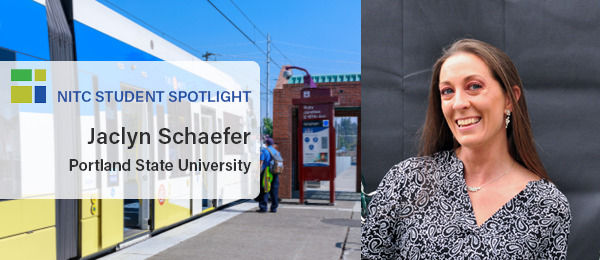Student Spotlight: Jaclyn Schaefer, Portland State University

Jaclyn Schaefer is a graduate of the civil engineering master's program at Portland State University. A former Dwight David Eisenhower Transportation Fellow, she is now a Transportation Engineer 2 in training at the Washington State Department of Transportation. During her time at PSU, Jaclyn worked as a graduate research assistant on various projects with Dr. Miguel Figliozzi. At the 2020 TRB Annual Meeting, she presented the results of a study examining how the presence of bicycles on roads without bicycle lanes affects passenger vehicle travel speeds. Jaclyn was awarded NITC scholarships during both the 2018/19 and 2019/20 academic years.
Connect with Jaclyn on LinkedIn
Tell us about yourself?
I am a recent graduate from Portland State University, where I received a MS in civil and environmental engineering, and previously completed a BS in civil engineering. During my time as a graduate student at PSU, I was fortunate to work under Dr. Miguel Figliozzi conducting research on factors affecting traffic speeds and speed limit compliance on roads with a high percentage of bicycles (an ODOT research project with co-PI Avinash Unnikrishnan) and studying the spatial distribution of Amazon locker facilities with respect to a number of sociodemographic and transportation-related characteristics for an equity analysis (a research project for the Freight Monitoring Research Institute). Currently, I am working for the Washington State Department of Transportation and am involved with one of the many fish passage projects that are in progress. These projects serve to restore fish habit by removing barriers, for example, by replacing an old pipe culvert with a new, fish-passable structure. Outside of work, I enjoy hiking, photography, and traveling.
What (or who) has influenced your career path in transportation?
During my undergraduate degree, some of the classes I enjoyed most were those specific to transportation. These classes really opened my mind to how complex a transportation system is, and I became more and more motivated to find answers to why traffic behaves the way it does and how changes to various components of the system can influence these behaviors. I also worked as a fleet manager for a small operation for several years, scheduling, dispatching, and routing highly time-sensitive deliveries. This position made me even more aware of the frustration that could be felt due to unpredictable travel times during peak hour traffic and areas where safety and compliance to traffic laws were substandard. I wanted to help do something about these issues I saw, to help improve the quality of life of the traveling public by creating safer roadways, mitigating traffic congestion, and promoting better public transportation and active travel options.
You've worked as a graduate research assistant with Dr. Miguel Figliozzi - tell us about a project you've been involved with?
My most recent project with Dr. Figliozzi involved a spatial accessibility and equity analysis of Amazon parcel locker facilities across the greater Portland area. Increasing order fragmentation brought on by the free or low-cost rapid delivery options being offered in the booming business-to-consumer e-commerce sector have led to reduced efficiencies and higher costs in the last mile of delivery. Parcel lockers, which operate as unmanned pick-up points, can help mitigate these issues and can offer additional benefits to the public and the supply chain. For this project, sociodemographic, land use, roadway, and employment datasets were collected, and cluster analysis was utilized to help understand how lockers are distributed with respect to accessibility measures and what the equity implications of the current distribution of lockers are. The research found that lockers are accessible by automobile for the vast majority of the population in the Portland metro region, but the share of the population that can access lockers by walking is significantly smaller and this may present a challenge for non-driver populations. The results of the analysis also suggested that Hispanics and Latinos, people with low education levels, or people who have limited English language abilities have less access to this valuable service. Public agencies and policymakers could use this approach to guide the placement of incentives to locate additional public lockers in urban areas where they are needed the most to fill an equity or accessibility gap, facilitating deliveries for those who are transportation disadvantaged or time poor.
At WSDOT or beyond, what future work do you envision doing in transportation?
I really enjoy working in a project office and could see myself as a project engineer someday. I also have an interest in transportation demand management, which could enable me to combine my passions for transportation engineering and human behavior analysis. Ultimately, my goal is to improve the quality of life of my community and beyond through safe, efficient, and multimodal transportation options.
Photo by artran/iStock
This is an installment in a series of monthly Student Spotlights we're shining on students and alumni that are involved with National Institute for Transportation & Communities (NITC) universities. NITC is a university transportation consortium funded by the U.S. DOT, and is a Portland State-led partnership with the University of Oregon, Oregon Institute of Technology, University of Utah, University of Arizona, and University of Texas at Arlington.
